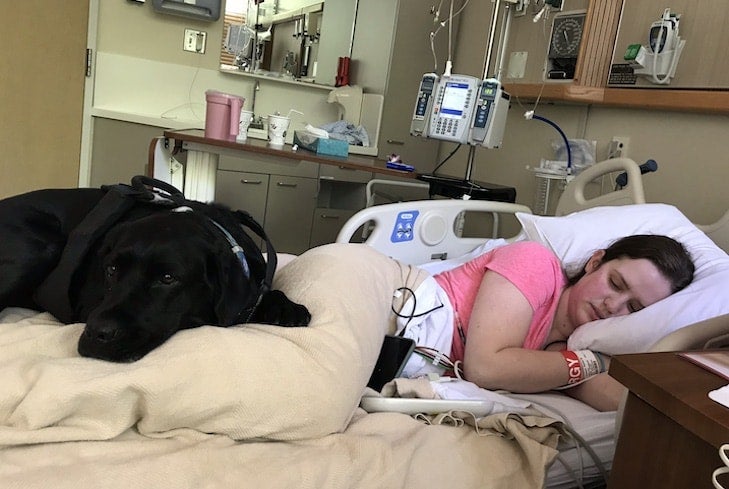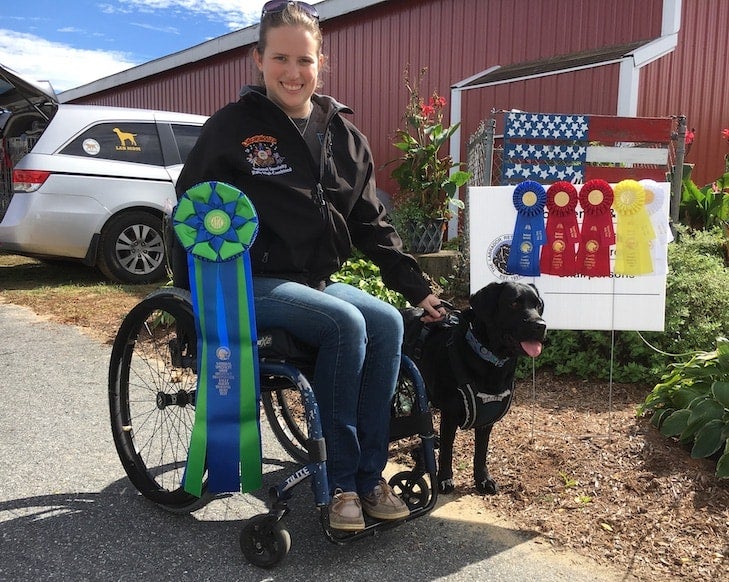
From unending hours in ambulances and her owner’s hospital room to hanging out at the University of Nevada, Reno (UNR) rifle team’s noisy practice, Polly and her unflappable personality have been put to the test this year.
“She’s unfazed by almost anything,” says owner Rachel Husband, 28, of Sparks, Nevada. “She trusts me while adapting to every situation that I have put her in.”
For Husband, an athletic academic coordinator for the UNR track and field, cross-country, and rifle teams, the 5-year-old black Labrador Retriever is her soul mate in life and dog sports. Husband suffers from a rare autonomic nervous system disorder called Dysautonomia, which triggers fainting. For the last few years, Polly has been her trusted service dog.
In acknowledgment of Polly’s prowess, she has been named winner of the 2019 AKC Humane Fund Award For Canine Excellence (ACE) in the “Service Dog” category. Polly and Husband will be recognized at the AKC National Championship presented by Royal Canin in Orlando, Florida, in December.
“My nurse was in the hospital room watching as I read my phone,” Husband writes of the proud moment she received the ACE news. “My face turned to the biggest smile I might have ever had, and the cardiac monitoring started to move higher and higher as I swelled with pride. There might have even been a tear or two. Polly won! But it was more than that. We’ve won at dog shows, but here she was winning at her job – being my service dog.”
ACE In The Hole
Before bringing then 9-month-old Polly home in 2014, Husband had undergone three hospital stays, but none were lengthy. This year has been a stark contrast, as she’s spent 127 days as an inpatient in intensive care. All the while, her 60-pound partner Polly was alongside her in medical facilities in Reno and at Stanford University.
“There were days when she was getting a bit of cabin fever as any dog would,” says Husband. “I had a friend come by to take her to a local park to let her run around and chase her ball. That’s always the best way to de-stress her. Once during a recent stay, Polly spent the night at my friend’s house because I reacted to a medication, and was sedated for several hours.”
“Polly, I was told, completely took over the bed of my friend and her husband. She slept right in the middle of the two of them as if it was her own house,” recalls Husband with a laugh. “She returned to the hospital early the next morning refreshed and happy to be back.”

Polly has a special rapport with the hospital staff, too. All of the Cardiac Intensive Care Unit nurses at the local hospital are acutely aware of the important role she plays in Husband’s life. They understand the need for a quick response if Polly beckons one of them to come to her room.
The calming presence Polly brings is invaluable in the hospital. She always puts a smile on people’s faces when they enter Husband’s room. Husband claims the pup has a sixth sense during rough days, as she always manages to find her way onto the bed.
During lengthy hospital stays, Husband’s Facebook network of friends, otherwise known as “Team Polly,” springs into action. One person manages a spreadsheet with days and shifts, and people sign up when they can stop by the hospital to walk or exercise the spirited Lab.
Adjusting To A New Normal
Earlier this year, Husband underwent a procedure called a hybrid thoracoscopic epicardial ablation, designed to slow down her heart and prevent fainting. The technique was developed in Belgium, and she was only the fourth person at Stanford on which it was performed. Following the surgery, she did not faint for eight weeks, but complications later arose. She had a second procedure in August and may face a third later this year. During the process, all was not smooth for Polly, either.
In the Intensive Care Unit at Stanford, some patients were undergoing bone-marrow transplants. Due to their suppressed immune systems, no animals could be on the floor. Husband expressed her concern without Polly, however, and was swiftly moved to another room where the two were reunited.
Upon first being diagnosed with Dysautonomia at age 14, Husband’s once-busy lifestyle was been altered in all sorts of ways. She had been deeply involved in riding horses, but her disorder made it nearly impossible to keep up that life.
“It changed everything,” she acknowledges. “There were times when all I could do was get out of the car and visit my horse in the barn for a few minutes. I had regular fainting spells and I was homebound for my last two years of high school. The school sent a teacher to my house three to four days a week for a few hours.”
Prior to Polly, Husband owned a Lab, a Golden Retriever, and a German Shepherd Dog. She ultimately found that Labs best fit her lifestyle and personality, due to their easygoing nature and acceptance of people.

“With my disease, I often have to rely on others for help,” she explains. “I’d worried over being in a situation with an overprotective dog. If I fainted, they may not have allowed medical personnel to get close enough to help.”
While Polly has yet to learn to alert before Husband’s fainting spells, she always understands how to respond by summoning help. On top of that, Polly aids in pulling the wheelchair, retrieving items, and even tapping a special button to call 911 in an emergency. “She is my go-to girl when any need arises,” Husband says with a smile.
But, despite Polly’s stellar service dog duties, don’t be fooled into thinking this pair is all about hospital stays.
From Service Dog To Sports Star
Remarkably, Husband and Polly have traversed the AKC dog sports world in Rally, Obedience, FastCAT, Barn Hunt, and even some Hunt Tests. Of those sports, Rally takes precedence, as it’s the easiest logistically for Husband to navigate with her wheelchair. Before starting to compete, however, Husband had never even heard of the teamwork-driven sport.
“I never went to a class before entering our first show,” admits Husband. “I was on the AKC site one night to complete some paperwork when I came across Rally. I’d never heard of the sport, so I was curious. I’m the type to dive into something completely, so I searched for the nearest club, and they happened to have a Show & Go that very weekend.”
After a wild introduction to the sport, Husband and her velcro dog partner Polly were hooked. She entered her first show three weeks later, and the rest is history. Husband’s ultimate goals are to compete in all 50 states and earn a RACH (Rally Champion) title for Polly. The precocious pup has already earned Rally Master (RM) 2 and Rally Advanced Excellent (RAE) 2 titles.

Asked what other challenges she enjoys taking on with Polly, aside from service dog work and sports, Husband recalls a recent trip up to Alaska to watch the UNR rifle team compete for a championship.
“We were up there for nearly a week and experienced minus 40 temperatures,” she says. “We stayed up late to drive out into the wilderness to see the Northern Lights and cheer on our students. Polly definitely prefers the cold, so watching her play in the snow like a crazy thing was a hoot!”
Together, Polly and Husband have proven to be an outstanding example of what a strong service dog team is capable of, and the AKC is proud to honor Polly as a 2019 ACE Award winner.
The AKC National Championships presented by Royal Canin will take place Saturday and Sunday, December 14 and 15, 2019, in Orlando, Florida. Tune in to AKC.TV or download the AKC.TV app on Roku, Apple TV, or Amazon Fire TV to catch the live stream.

